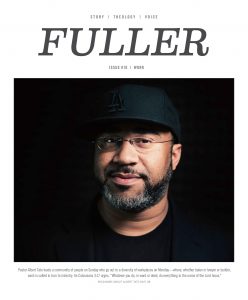In the world of Fuller, Max De Pree (1924–2107) was longtime chair of Fuller’s board, generous donor, and confidante of our third president, David Allan Hubbard. Beyond Fuller, he cut a prestigious figure as CEO of furniture company Herman Miller and was among Fortune magazine’s national business hall of famers. I met Max recently when FULLER studio went to his home in Holland, Michigan, to film a conversation with him and fellow board members John Ortberg and Sam Reeves (watch the video interview here). Though Max was surprisingly robust, he was very ill at the time: He fell asleep less than three months later.
Though his commitment to the seminary was well known, I was still surprised to hear this titan of business say that his life’s priorities were family and Fuller. A remarkable success by anyone’s standards, Max knew that his “work” extended well beyond manufacturing the iconic Eames chair and the other furniture that Herman Miller was known for. He was a maverick, instituting practices that humanized the workaday experience. Believing that a fruitful business could also be a caring organization, his ideas of an inclusive workplace in which all voices are heard are memorialized in his best seller Leadership Is an Art. An advocate for rigorous communication, he warned that every institution needs “tribal storytellers” or they risk forgetting who they are.
Mark Roberts, director of Fuller’s Max De Pree Center for Leadership, is guest editor of this issue’s theology section.He has gathered here many voices who elaborate on beliefs that shape practice in the same way that Max’s theology shaped the way he lived and worked. Their reflections, too, have helped me to contextualize a new role I have at Fuller—because a more unpredictable path to the Herman Miller desk chair I presently occupy could hardly be imagined.
Not long after that visit to the home Max shared with his wife, Esther, I took on a new title at Fuller. Unexpectedly, Max’s last public words of wisdom clarified my work for me as he has done for so many. His daily work had eternal value because of his faith; he saw that clearly. It was, for him, all one piece— his work, his calling, his faith, his family, and his irreplaceable contribution to the school that he loved: Fuller.
A friend recently sent me a postcard with a quote by poet Wendell Berry: “It may be that when we no longer know what to do we have come to our real work . . . The mind that is not baffled is not employed. The impeded stream is the one that sings.” I may be baffled or impeded or unsure in my new role, but because of Max’s clarity, I know why I am here. Rest in peace, Max De Pree, and thank you for your wisdom that is shot through the pages of this magazine and that has defined the path ahead for Fuller.


